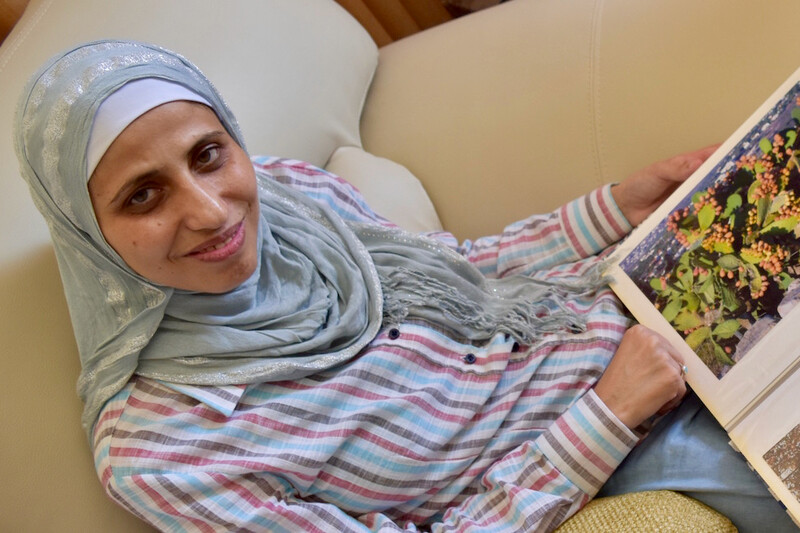The Electronic Intifada 29 May 2017

“By persecuting me, the Israeli authorities are trying to erase Palestinian voices and to silence any artistic expression that opposes the occupation,” says poet Dareen Tatour.
Dareen Tatour felt sad as she watched this year’s “march of return” on television.
The poet had wanted to attend the event in memory of Palestinian villages that Israel has tried to erase from history. Being under house arrest prevented her from doing so.
“I have been taking part in the march of return for as long as I can remember,” she said. “I am gutted that I could not attend for the past two years.”
Tatour, who is also a photographer, has spent much time capturing images of the villages depopulated and people displaced by the Nakba, the 1948 ethnic cleansing of Palestine. These include al-Kabri, where this year’s march took place.
Located on the western slopes of the Galilee, it was destroyed by Zionist forces on 20-21 May 1948 – a week after Israel declared itself a state.
Tatour was arrested in October 2015, at a time when many Palestinians were in open revolt against the Israeli authorities.
On 10 October that year, Israeli police raided her home in Reineh, near the city of Nazareth.
It transpired that she was arrested for writing the poem, “Resist, my people, resist them.” She was later charged with incitement to violence.
After being released from three months in prison, Tatour was placed under house arrest.
The Israeli authorities alleged that restricting her movements was necessary as she constituted a “threat to public safety.”
After more than a year of complete house arrest, she was placed under a curfew following a recent hearing at a Nazareth court.
Under terms approved by the court, she is allowed to leave her home – accompanied by a family member – between 9 am and 7 pm. Yet she is still banned from using the Internet.
Missing “small details”
In response to that easing of restrictions, Tatour went for a walk in Nazareth’s Old City. It was something she had dreamed of for a long time.
“Before all of this started, I used to walk in the streets of Nazareth’s Old City regularly, with my camera, and I would always discover new details,” she said. “And it is those small details that I really miss and which I learned to appreciate even more while under house arrest.”
The terms of her house arrest have been severe.
For six months after being released from custody, she was forced to live in Kiryat Ono, a town near Tel Aviv, always accompanied by at least one family member. As well as having an Internet ban, she had to wear an electronic tag. This meant she was under constant surveillance.
According to Tatour, those six months were akin to being in solitary confinement or exile. “I was separated from everything I loved, at times staring at the wall for hours,” she said. “Writing was the only thing that kept me afloat.”
In July 2016, she was allowed to return to Reineh and to remove the tag.
House arrest has “stretched me and my family to the very limits, both emotionally and financially,” she said.
She had to rent the apartment in the Tel Aviv area and her legal expenses have left her in debt. A crowdfunding campaign to help defray those expenses has been set up. She is unemployed.
Her plight has won support from writers and activists around the world, including such well-known authors as Alice Walker and Eve Ensler.
Freedom facade
Despite the Internet ban, Tatour has been kept informed of the international solidarity efforts. Friends visiting her have brought copies of articles about her and letters from supporters.
“By persecuting me, the Israeli authorities are trying to erase Palestinian voices and to silence any artistic expression that opposes the occupation,” she said. “But this solidarity keeps our voices loud and counters Israel’s attempt to isolate us.”
Tatour never thought that her poem would get so much attention. “After all, it was a simple, spontaneous call for resisting occupation,” she said. “But Israel’s response to the poem is evidence that all Israeli talk about democracy and freedom of expression is a facade. For us Palestinians this has always been clear.”
Tatour identifies uncertainty as one of her biggest problems. “I feel like all this time has been snatched away from my life,” she said. “While I’m sure it will come to a close at some point, I don’t know when.”
A verdict in her case is likely to be delivered in June. If found guilty of incitement, Tatour may be imprisoned for up to nine months. All that she is guilty of, she added, is resisting Israel “with my pen and poems.”
She is working on a memoir about her experience in custody and house arrest. “Despite the pain and mental fatigue, this experience has been like a rebirth,” said. “It’s the rebirth of a new Dareen, a stronger, more resilient woman who is convinced that intimidation and the deprivation of freedom cannot defeat her.”
Budour Youssef Hassan is a Palestinian writer based in Jerusalem. She blogs at budourhassan.wordpress.com.





